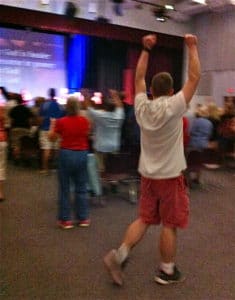When a Church is Family

My friend, Emily Colson, recently posted an exceptional story that answers this question. Her 25-year-old son Max has autism and there was a time Emily and Max could not find their place in a church. But now Emily describes their arrival to church as “entering holy ground.” For even as Max bursts through the doors in high-energy, swinging his favorite vacuum – he’s on the clean-up crew – people are not put off. He is lovingly welcomed and greeted. Not only that, some men in the church have reinforced the platform Max dances on during worship. They could have asked Max to quit dancing there; instead, they just made adjustments. Emily says, “What has changed Max’s life is what has changed mine: he is loved. He belongs. He is indispensable.”
This was illustrated further on a day the church was having a picnic after the service. They were just finishing up with a slow worship song and when the song concluded you could hear a pin drop. At that moment, Max erupted with a booming voice announcing “BAR-B-QUE!” Now there are many ways the congregation could have responded. There could have been glances back in disappointment or annoyance but that didn’t happen. The church exploded with laughter. And Emily heard someone say, “That’s our Max.” Because of Max, this church has learned how to love, accept and enjoy one another in a deeper way.
“But in fact God has arranged the parts in the body, every one of them, just as he wanted them to be … those parts of the body that seem to be weaker are indispensable. – 1 Corinthians 12:18, 22
My friend, Emily Colson, recently posted an exceptional story that answers this question. Her 25-year-old son Max has autism and there was a time Emily and Max could not find their place in a church. But now Emily describes their arrival to church as “entering holy ground.” For even as Max bursts through the doors in high-energy, swinging his favorite vacuum – he’s on the clean-up crew – people are not put off. He is lovingly welcomed and greeted. Not only that, some men in the church have reinforced the platform Max dances on during worship. They could have asked Max to quit dancing there; instead, they just made adjustments. Emily says, “What has changed Max’s life is what has changed mine: he is loved. He belongs. He is indispensable.”
This was illustrated further on a day the church was having a picnic after the service. They were just finishing up with a slow worship song and when the song concluded you could hear a pin drop. At that moment, Max erupted with a booming voice announcing “BAR-B-QUE!” Now there are many ways the congregation could have responded. There could have been glances back in disappointment or annoyance but that didn’t happen. The church exploded with laughter. And Emily heard someone say, “That’s our Max.” Because of Max, this church has learned how to love, accept and enjoy one another in a deeper way.
“But in fact God has arranged the parts in the body, every one of them, just as he wanted them to be … those parts of the body that seem to be weaker are indispensable. – 1 Corinthians 12:18, 22






